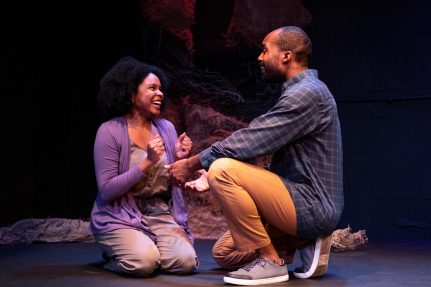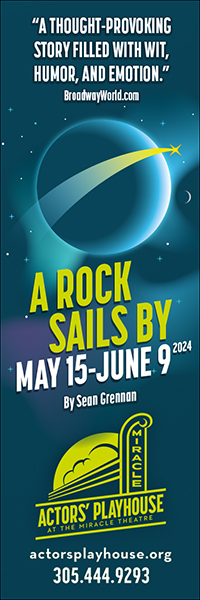
Marlo Rodriguez and Denzel McCausland as the lovers debating whether to have a child in a troubled world. / Photos by Ryan Arnst
By Bill Hirschman
Some scripts are trapped as period pieces exemplifying only the time they were written. Others only deepen with time. Lungs, written a decade ago, illustrated the millennia-old concerns of potential parents.
But the primary source of fear in Lungs — bringing a child into an environmentally crumbling world and an economy in freefall — has metastasized and intensified in the past few years to the point of dread.
With dire warnings about climate change on every other front page and daily Facebook feed, New City Players’ solid delivery of this difficult two-hander play echoes even more loudly than when Arts Garage mounted a triumph in 2013.
From the moment Marlo Rodriguez and Denzel McCausland appear under Elizabeth Price’s superb direction, the audience is charmed by the duo as they banter non-stop with the familiarity that only a couple in love can exude.
Over the odyssey, including two course-changing emotion-wrenching plot twists, they say out loud the angst-ridden inner thoughts that any duo has in deciding whether to have a child.
Yet despite the universality of that conundrum and the all-too-timeliness of the eco-issue, neither are what the play is about.
Duncan Macmillan’s breathtaking script is really examining the fragility and tensile strength of relationships. It depicts the conundrum of deciding whether to deal with loved ones with your head or your heart. Sometimes our protagonists over-think their search for the right answers, sometimes they simply trust their emotions – with Macmillan seeing neither as a standalone solution. Each partner evolves until each ends up taking the other’s approach. Funny, moving, insightful and incisive, Lungs is a never-static kaleidoscope of ideas and emotions.
Over 90 minutes, we watch the evolution of a romantic relationship between two attractive and adorable young people: a quirky voluble woman working on her Ph.D. who is sincerely concerned about the ecological ills, and her live-in lover, a warm-hearted musician who is as crazy about her and she is about him. They are nameless in the script, Everypeople who might as well be called Adam and Eve – which we will here for clarity’s sake.
Adam has just flummoxed Eve with the proposition that they have a baby. We eavesdrop as they work through this decision-making process. She is far more garrulous because she thinks out loud. She launches into a hysterically funny stream-of-consciousness monologue that includes an obsessive imagining of the child’s birth and maturation. Later, she will accuse Adam of over-thinking, but clearly she is as guilty of it as well. But Macmillan makes a strong case for such caution as he has Eve frequently reference the horrors in today’s world and those even worse just out of sight in the near future.
Amid the laughs, Macmillan has interjected questions that prospective parents ask themselves in the wee hours: Are we good people, good enough to raise a child; what happens if I don’t fall in love with the child, and is it fair to the child or to humanity to bring a life into a world facing overcrowding, global warming and an imploding economy?
The actors and director tirelessly drive a torrent of Macmillian’s dense verbiage and emotions more furiously than an open fire hydrant. In the intimate venue of Island City Stage, you can see changing emotions – no matter how buried—in the character’s faces. Bodies, voices and emotions careen around the stage like electrons loose in nuclear fission.
Underscoring that the challenging yin and yang of relationships are the real focus of the play, the couple frequently start sentences, but don’t finish them, because their partner cuts them off in overlapping debate or they can’t find the words or one partner knows what the other one means to say and halts the conversation with an acknowledging nod. What seems incomplete and nearly unintelligible on the page is made natural in the hands of the actors and director.
Macmillan’s script is problematic to begin with. There are no stage directions and while scenes change on the twist of a head, the script doesn’t indicate when the scene has changed; it’s just one fluid piece. So credit goes to Price – and lighting designer Desiraé Merritt – along with the actors for making the scene changes distinct but cinematically smoothly sliding into each other.
Price and Intimacy Choreographer Nicole Perry help sell the chemistry between the couple with considerable and varied physical manifestations of affection from hand-holding to sexual intertwining.
The two actors, former students of Price, are not well-known in South Florida productions, but hopefully they will be after this. With Price’s considerable leadership, they have mastered a killing script.
Rodriguez buzzes, bubbles and burbles with words gushing out unable to keep up with Eve’s underlying passion. Here’s just a snatch of the lengthy convoluted aria Macmillan gives her early in evening:
“And I’ve pushed it all down and focused on my career, on my studies, on myself and now it’s becoming, potentially becoming a bit more real I’m going to have to think about it for a second please just a a a a a a or much longer in fact because well because I’m not an idiot, I’m a thoughtful, very thoughtful person and I want to do everything for the right reason or at least a good reason and I believe in questioning and never just blindly accepting or and it’s going to take a lot of effort to unravel or to to to to to to excavate not excavate but excavate all of those previously held beliefs and assumptions because it’s important probably the most important thing you could do to bring another person a yes a person an actually living breathing thinking because they won’t stay small forever….”
It goes on. And on.
McCausland’s Adam initially seems more laid back, patient and accommodating, so he isn’t as intrinsically compelling. But as the situation turns in on itself and the couple melts down, McCausland is fully convincing as Adam begins to let his anxiety have free expression. Even consumed with fear, he says of hope in the seemingly impending crisis, “If it’s going to happen, the solution to it all, the survival of mankind, it will happen in our lifetime. It has to. And we’ll be alive to witness it.”
Although the script calls for a bare stage sans scenery and furniture, Kathe O’Donnelly has created a Godot-like environment – mostly empty but dominated by an ancient gnarled white tree made of burlap and wire mesh with disconnected branches extending over the scene.
From its inception, New City Players has vowed a dedication to connecting its offerings with “the community” as a whole, and recognizing that the community as a whole may be a bit different than some mainstream companies had acknowledged. Setting an example for numerous local theater leaders who have pledged a redoubled commitment to diversity across the board, New City has cast Black actors in both roles as well as hiring an assistant stage manager and an assistant director who are Black — posts that many budget-conscious theaters do without in the first place – and an assistant stage manager who is African-American.
Just a side note: As I mentioned in my review of Arts Garage production, even now, eight years later, I have not got a clue what the title means.
Side side note: New City Players has moved its venue from Thinking Cap in Fort Lauderdale to Island City Stage in Wilton Manors.
Lungs is presented through Nov. 28 by New City Players, performed at Island City Stage, 2304 N. Dixie Hwy, Wilton Manors. Runs 90 minutes with no intermission. Tickets $25-$40. 8 p.m. Thursday-Saturday, 3 p.m. Saturday-Sunday. Tickets are $40 for adults, $35 for seniors (65+), and $25 for students (under 25 with ID). Tickets can be purchased at www.newcityplayers.org/season or by calling (954)-376-6114.
COVID Protocol: All patrons must remain masked during the entire performance. Be sure to bring tickets if you selected to print them or have them ready on your phone so front of house staff can assist in finding your seats.









 A PaperStreet Web Design
A PaperStreet Web Design
